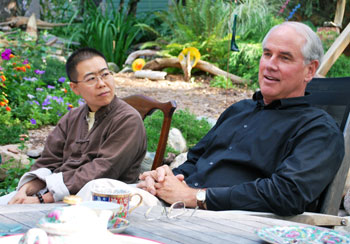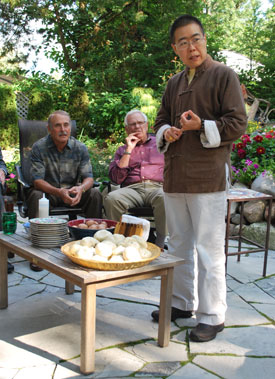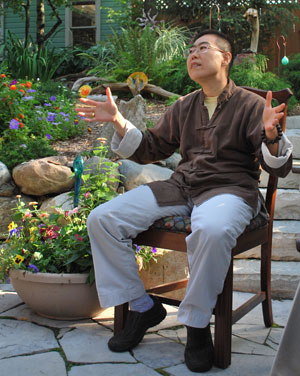Dr. Yun Lu: To Feed a Healing Courage

Yun Lu and Roger Newton at the home of Larry and Lucie Nisson, talking about the nonprofit Golden Courage International and a business venture, Dr. Lu's Healing Cuisine. (Photo by the writer.)
At a meeting of the Ann Arbor Public Market Advisory Commission earlier this month, market manager Molly Notarianni reported that she’d received a vendor application from someone who wanted to sell food that incorporated traditional Chinese medicine, including “steamed healing sweet buns” and “sweet lotus rolls.” Because she hadn’t yet approved the application, she didn’t reveal the name of the business, but market commissioners seemed intrigued.
Then at the Sept. 12 Homegrown Festival, The Chronicle encountered a booth for Dr. Lu’s Healing Cuisine, where balls of sticky rice wrapped in lotus leaves were selling briskly. Lucinda Kurtz, who was staffing the booth, confirmed that they had applied for a food cart at the farmers market.
So when The Chronicle arrived at the Eberwhite neighborhood home of Larry and Lucie Nisson in mid-September, it was the third time we’d encountered the venture, but the first time to meet its founder, Yun Lu, and to hear in detail about both the business and a nonprofit he started, Golden Courage International. Accompanying him was Roger Newton, a local entrepreneur best known for helping develop the cholesterol-lowering drug Lipitor and for later founding the Ann Arbor drug developer Esperion Therapeutics. Newton serves as chairman of the board for Golden Courage, and supports the nonprofit through his Esperance Family Foundation.
About a dozen people gathered in the Nissons’ backyard to hear more about these ventures while sampling tea eggs, sweet bean paste buns and rosebud chrysanthemum tea.
The Venue
This group wasn’t meeting for the first time. It’s a regular gathering hosted by the Nissons, bringing together some of the community’s business and government leaders in an informal setting to hear guest speakers. On this day, the group included Rich Sheridan of Menlo Innovations, Dave Lutton of the Charles Reinhart Co. Realtors, Del Dunbar, developer Ed Shaffran and Brian Weisman of Columbia Asset Management, among others.
Also in attendance were Lucinda Kurtz and her husband Oran Hesterman, CEO of the Fair Food Network, an Ann Arbor-based nonprofit that’s working to provide fresh, healthy food to traditionally underserved neighborhoods. Kurtz is the executive assistant for Golden Courage International, and Yun Lu serves as an advisor to the Fair Food Network. Hesterman was previously head of the Fair Food Foundation, which closed last year when its main funders – Jeanne and Kenneth Levy-Church – lost significant investments they’d made with Bernie Madoff. The Fair Food Network is being funded by several major grants, including ones from the Kresge Foundation and the Community Foundation of Southeast Michigan.
Dr. Lu’s Healing Cuisine
Hesterman introduced Yun Lu, citing Lu’s background in traditional Chinese medicine – he has a medical degree from the China Academy of Traditional Chinese Medicine in Beijing. Lu has unique skills and products, Hesterman said, and “Ann Arbor seems to be a very ripe place for these kinds of things.”

Yun Lu describes the food on the table in front of him, which he says has healing properties and is based on family recipes dating back several hundred years. Sitting in the background are Larry Nisson and Del Dunbar. (Photo by the writer.)
Lu described the food that the group was eating, noting that some of the items used locally grown ingredients, such as kale in the steamed vegetable buns from Tantré Farm and eggs from Holtz Farm. He talked about nature’s two main energies – yin and yang – and how different foods are linked to these energies. Eggs are a yin energy, and should be eaten in the fall – which accounted for the tea eggs that were served, hard-boiled in tea and herbs. All the ingredients are selected to help balance and heal the body’s systems, Lu said – the hot rosebud chrysanthemum tea, for example, balances the liver system.
The food is prepared in part based on family recipes that date back generations, at least to the 1600s. Lu’s family was royalty in the Manchurian Qing dynasty, which ruled from the mid-1600s to the early 1900s. Their role was to provide the emperor with food and medicine, Lu said. “So this is just an extension of the family business,” he joked.
Last week the business received permission to sell at the Ann Arbor Farmers Market, Kurtz said, but they probably won’t gear up for that until spring. They currently offer take-out meals, preparing soup, a chicken or tofu dish, two vegetable dishes and rice for $30 each week. Customers order in advance and pick up the meals on Thursdays at an office on West Summit. [The business does not yet have a website, but can be contacted via email at DrLuCuisine@gmail.com.]
The idea, Lu said, it to return to fresh, seasonal food that nurtures your entire body.
Rich Sheridan asked if this might be the solution to the health care crisis. “Would you advocate that we eat like this every day?” he asked.
Yes, Lu replied.
With the country facing a crisis in mental health disorders, Sheridan continued, would this approach affect that as well?
There is a connection between the stomach and the brain, Lu said. Practitioners of traditional Chinese medicine look at the digestive system. In America, most people – including health professionals – don’t pay attention to their diet, he said. It’s important to take a holistic approach, looking at yin-yang balance and energy flow.
Roger Newton pointed out that the country is getting a wake-up call regarding its food system, noting that in China, most food is produced locally and with no preservatives. There are some promising signs here, however. He cited an increase in the number of local farmers markets, and a growing interest in heirloom vegetables as examples.
“I think people are becoming a lot more conscientiously conscious of what they put in their mouths,” Newton said.
Newton, who holds a Ph.D. in nutrition, said he sees great potential in nutraceuticals – using food extracts to achieve a medicinal effect, an approach that Newton said is more effective and less toxic. His wife, Coco Newton, is also an advocate of nutrition as a means to better health – she’s a clinical nutritionist and owner of Lifetime Nutrition, which provides medical nutrition therapy.
Reflecting the importance of that belief, Newton said that the tagline for Esperion Therapeutics was changed from “pathways to new medicines” to “pathways to better health.”
Lu sees himself as an example of the effect that this kind of lifestyle can have. Del Dunbar asked how old Lu was, saying he looked like he wasn’t much older than 21. “I’m 43,” Lu said, noting that he doesn’t drink or smoke. “I age normally. Most people age faster than they should.”
Golden Courage International
Though Dr. Lu’s Healing Cuisine is a for-profit venture, a portion of its proceeds will be used to support Golden Courage International, which Lu founded in 2001. At that time, Wu Yi, who was China’s deputy to the head of public health and is now China’s vice premier, tapped Lu to conduct an HIV/AIDS study in Henan Province. Wu Yi was a friend of Lu’s mother. At that point Lu was living in the U.S., after having a “little misunderstanding” with the Chinese government. [He was a student leader in the 1989 Tiananmen Square protest.]
So Lu traveled to rural, central China and discovered how AIDS had devastated much of the population there. The disease had been spread during a blood shortage in the 1990s, Lu said, when workers used the same needles to draw blood multiple times from different donors. They’d extract plasma from the blood, then re-inject donors with blood that had been pooled from multiple sources, thus spreading the disease.

Dr. Yun Lu explains the work of the nonprofit he founded, Golden Courage International. He also talked about his own childhood during China's Cultural Revolution, when he was separated from his parents and lived on the streets with his grandmother and a Buddhist monk. (Photo by the writer.)
Lu said he was especially touched by the children, who often became caretakers for their sick relatives. One little girl told him she’d changed her name to “Golden Courage,” because that’s what she’d need to care for her brother, mother, sister-in-law and niece – all of them had AIDS. She had quit school to support them, Lu said, but dreamed of going back to study some day.
Nine months after his initial visit, Lu returned and found the girl named Golden Courage again. By then, her brother and niece had died from AIDS, and her sister-in-law had committed suicide. When he asked Golden Courage about her plans to return to school, she said, “I was a child back then. I don’t dream anymore.”
It was a pivotal moment, Lu said. “What kind of society is it where children can’t dream?” So he began advocating for the children, most of whom were living in extreme poverty without access to education, health care or adequate food. Many are part of what’s known as China’s “floating population,” he said, who travel to wherever they can find jobs.
Today, Golden Courage International is one of only 10 legally sanctioned nonprofit organizations in China, Lu said. Its programs work with children ages 6 to 15, helping with education and family support services. They also operate a rescue hotline in Beijing, to help remove children who’ve been forced into prostitution or hard labor. And the girl who inspired Lu to action? She’s studying to be a nurse, Lu reported, and eventually a doctor.
Roger Newton said he met Lu in 2004 when the doctor – who now lives in Ann Arbor – visited at the invitation of Rita Benn, a clinical psychologist and vice chair of the Golden Courage International board of directors. Newton had just closed the deal to sell Esperion Therapeutics to Pfizer for $1.3 billion, and had used 25% of his personal gross proceeds from that sale to start the Esperance Family Foundation. The foundation focuses on serving four areas: human potential, social justice, health and the environment. [In 2008, Pfizer spun off Esperion as a private entity – it's based in Plymouth and led by Newton.]
In his travels around the world, Newton said he’d been incredibly disturbed by the wasted human potential he saw and the lack of caring for children, and knew he wanted to do something about it. So when he met Lu and heard about Golden Courage International, “it was as if that dim light bulb in my head became very, very bright.”
The foundation made a multi-year financial commitment to Golden Courage International, and Newton now chairs its board. He has traveled with Lu to China to see the work that’s being done, as have Kurtz and Hesterman. “The resiliancy of the human spirit is unbelievable,” Newton said. “There’s this hope – and that’s where Esperance really resonates. It’s the noun for hope.”




Wow! What a fascinating article. Thanks, Mary. I had one of the healing buns at the Homegrown festival. That’s cool that they are going to be around town more often.
Not a topic that would normally catch my interest. However,Mary’s writing skill lured me in. What I found was a wedding of commercial, non-profit and intellectual interests. This is the kind of thing Ann Arbor needs.
Mary, keep us informed of the progress of this venture. It might be something my firm’s employees could subscribe to for our working lunch meetings.
Lucky for me. I live just a 2 minute walk from Dr. Lu’s kitchen. I’ve had 4 meals prepared by Dr. Lu since August and always feel pleasantly and curiously satiated afterwards. I lived in San Francisco for most of my adult life, so have dined in many fine Chinese restaurants. But Dr. Lu’s dishes somehow satisfy in a way that those meals didn’t. Maybe it’s the healing herbs or just the fresh ingredients, but I find myself looking forward to the next Thursday dinner. I hope the menu includes some healing buns soon. Thank you, Dr. Lu.